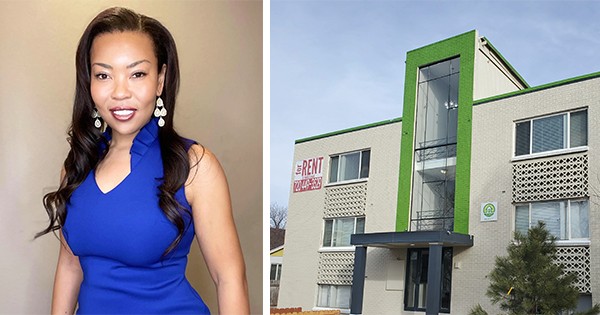Realtor Teaching Investors Creative and Profitable Alternatives to Gentrification
Denver real estate broker Michelle Thomas remembers well her early days growing up in North Aurora, a rough part of the Denver, Colorado metro area, that includes East Colfax Avenue. Stretching 26.5 miles, it’s the longest commercial street in the United States, but it and the surrounding area is best-known by natives, for longstanding squalid conditions: dilapidated buildings and seedy motels overrun with drugs and violence, a haven for the homeless and an enduring symbol of hopelessness and despair. However, Thomas, now 39-years old, a University of Colorado Boulder Leeds School of Business graduate who went on to establish her own residential and commercial and real estate business, has a different vision.
Thomas, a Senior Real Estate Advisor at KW Commercial, sees great “hope, promise and potential” in dense urban zoning areas, often consisting of many crumbling small C-class, 5-40 unit multi-family apartment buildings. She says many residents complain that the properties are in disrepair due to slumlords who do little to nothing in terms of investing into their properties or the community overall.
“Rents are much lower in distressed neighborhoods, so many owners of small apartment buildings are not motivated to make improvements,” says Thomas, a licensed Colorado real estate broker and active real estate investor. “Many buildings are not up to city code, which prevents many landlords from being able to accept Section 8 program vouchers, which comes with the added benefit of rent payments subsidized from county/city government. This adds to the ongoing problem of a lack of affordable and quality housing for many low-income tenants. I believe there’s a way that’s being overlooked for both the investor and the renter to benefit.”
She says progress has been slow in North Aurora, especially in comparison to the explosive growth experienced incomparable urban neighborhoods in Denver, which have emerged as hot real estate markets, attracting large-scale redevelopment, drawing a plethora of valuable amenities, luxury homes, and new businesses. She believes, however, with some targeted effort, North Aurora, home to world-class medical facilities, a light rail station and new hotels and apartment developments, along with other distressed communities nationwide in certain zip codes, can thrive without having to resort to gentrification. “My hope is that many more commercial property investors will begin to see the light,” she says. “They just need a little push and it does not have to entail pushing out lower-income residents who have deep roots in the community.”
That “push” Thomas believes could be – and she asserts more often can be – achieved with the help of a little-known housing initiative spearheaded during the Trump administration. The Opportunity Zones Program is a community investment incentive program established by Congress in the Tax Cuts and Jobs Act of 2017 aimed at encouraging long-term investments in low-income urban and rural communities nationwide. The national program provides a tax incentive for investors to re-invest their unrealized capital gains into dedicated Opportunity Funds in certain targeted zip codes.
“It’s a national program with the objective of encouraging investors to focus on distressed communities throughout America and rewarding them with huge tax incentives,” says Thomas, of Far Northeast Denver. “They can defer paying taxes on the original capital gain until they dispose of the investment or until 2026. If they hold on to the investment for at least five years, they will have to pay 10 percent less taxes on the original capital gain. If they hold it for at least ten years, they will not have to pay any capital gains tax on their Opportunity Zone investment, which is a remarkable deal.” The program has faced some criticism for not being well promoted and some assert that it primarily benefits mostly larger, commercial investors. Thomas, however, disagrees. She believes with some creativity and a front-end investment smaller investors can get their piece of the pie in distressed areas.
For example, Thomas says she has enjoyed success recently, connecting her commercial real estate clients, with lucrative multi-unit housing deals that qualify for Opportunity Zone Program incentives. Many have purchased and renovated dilapidated apartment units and leased them out to Section 8 tenants; thwarting gentrification, allowing many residents to remain in a community for which they have deep roots and yielding a high return. “It’s a win-win,” quips Thomas. “Renting out to Section 8 tenants fills a longstanding void in the rental market. My investor clients get guaranteed money every month because Section 8 program vouchers are usually much higher than unrenovated apartments leased at market rate. So, they are enjoying a considerably higher return on these investments; even higher than that of their other properties in other parts of town.” Explains Thomas: “They have fixed up these buildings that had long been in disrepair, in some cases for decades, and made them so nice, that the tenants want to stay forever. It’s good for everyone.” Thomas has also been working with some local nonprofits, helping them purchase affordable properties, renovate them so they can occupy the buildings in lieu of leasing a building long-term.
In many ways, her passion for breathing new life into long-neglected communities also resonates with her personally, as she, mom to a teenage daughter, had to endure a “makeover” and “renovation” of sorts, nearly a decade ago following a devasting divorce. “I had to work hard at rebuilding myself and building up my knowledge and experience in the real estate business, while also juggling the responsibility of taking care of my daughter solo,” says Thomas, who got her start in the industry marketing luxury properties for a Keller Williams firm in metro Denver before branching out on her own three years later. “I was able to grow and build wealth for myself and my daughter,” she says. “As a real estate professional from Colorado, woman, especially an African American woman in this industry, who came from this area, I have a strong sense of community. I want to give back and empower and educate others on how they can do the same, without pushing out longtime residents.”
Thomas is available to share her story of resilience in real estate, a perfect Women’s History Month feature, through all media platforms. For more information, visit MichelleThomasRE.com.
(Source: Black News)



